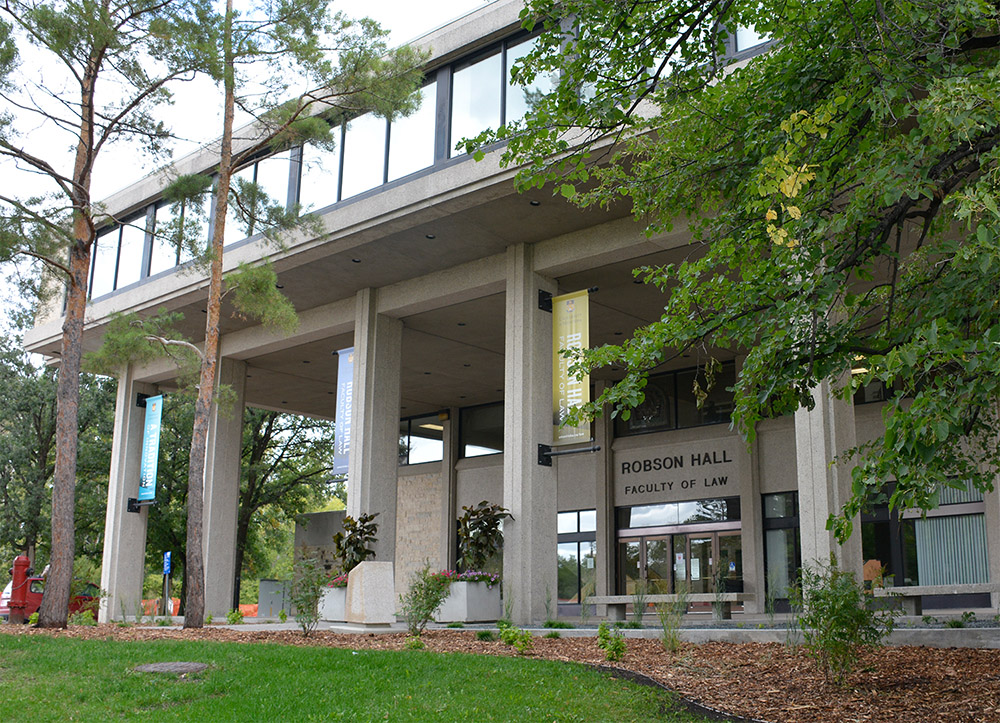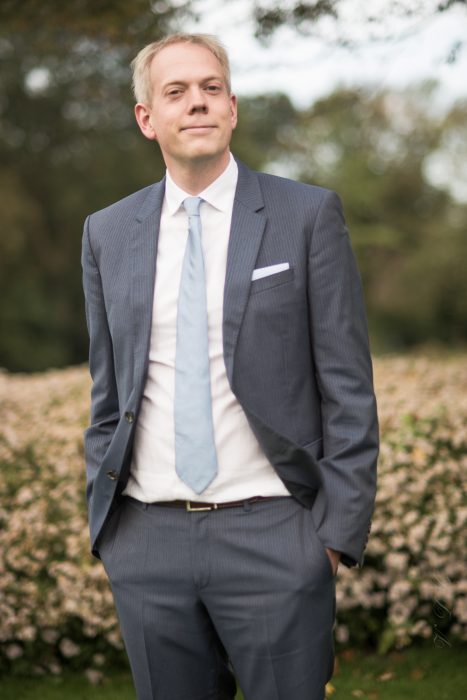
Robson Hall Faculty of Law houses the new Master of Human Rights program.
Meet the New Director of the Master of Human Rights program
New professor and students bring international experience to unique interdisciplinary program
A new group of students is calling Robson Hall home this fall, as the Faculty of Law launches Canada’s first interdisciplinary Master of Human Rights program. The new M.H.R. degree is an interdisciplinary and inter-faculty program running under the University of Manitoba’s faculties of Graduate Studies, Law, Arts, Education and Social Work, and working in collaboration with Robson Hall’s Centre for Human Rights Research, the Arthur V. Mauro Centre for Peace and Justice at St. Paul’s College, and the National Centre for Truth and Reconciliation. With options to do either thesis-based or practicum-with-major research project streams, the program offers students the opportunity to develop expertise, knowledge base and skill sets within a professional context.
Dr. Jonathan Black-Branch, Dean of the Faculty of Law to whom the program’s new director reports, said, “We are especially excited about the appointment of Dr. Kjell Anderson as director of this unique program, because he brings a rare combination of expertise in directing complex programs in Human Rights, and fresh ideas and partnerships to this degree program.”

Dr. Kjell Anderson, new director of the Master of Human Rights program.
Having lived, worked and studied in eight different countries and completed four university degrees all in conflict studies, law and human rights, Anderson is the ideal person for the job. Specifically, he will be teaching, guiding and mentoring a diverse cohort of graduate students from a variety of academic backgrounds, hailing from at least five different countries.
This diversity is part of the appeal of the program for Anderson. “There are several unique things about this program,” he said. “Being interdisciplinary, students can choose from different courses from across the university. It’s also distinct because there’s no program like it in Canada. Few programs if any are exactly like it internationally.”
While he notes that there are human rights-related law programs in Canada, he described them as “quite narrowly focussed, not interdisciplinary, or not at the Masters’ level.” As for Winnipeg itself as the location for the program, he said, “There is a critical mass here of human rights institutions, which I don’t think you have anywhere else in Canada at the moment.”
Anderson is not alone in this observation. In December, 2017, University of Manitoba Law Faculty alumnus, and dedicated advocate for world peace, social justice and human rights, Dr. Arthur Mauro, made a gift of $5 million from the Mauro Family Foundation intended to endow a cross-faculty Chair in Human Rights and Social Justice ($3M) and support local and international peace-building initiatives ($2M) to help make Winnipeg a “new Geneva.” When announcing the gift, Dr. Mauro identified many of the already-existing organizations that make Winnipeg an ideal centre for human rights advocacy, education and study.
“There is a critical mass here of human rights institutions, which I don’t think you have anywhere else in Canada at the moment.”
Similarly, Anderson pointed to the presence of the Canadian Museum for Human Rights; the Bachelor of Arts in Human Rights degree at the University of Winnipeg, Global College; the Masters and PhD programs in Peace and Conflict Studies offered at the Arthur V. Mauro Centre for Peace and Justice at St. Paul’s College; the Manitoba Human Rights Commission, the National Centre for Truth and Reconciliation, and within the walls of Robson Hall, the Centre for Human Rights Research, and the Canadian Journal of Human Rights.
“There’s a lot of opportunity here for students, I think, that will grow as the program grows in the future as well,” said Anderson.
As a Canadian university student who first obtained a Bachelors in International Studies at the University of Saskatchewan in his hometown of Saskatoon, and a Master’s in International Affairs and Conflict Studies at Carleton University in Ottawa, Anderson went outside of Canada, for his LLM and PhD degrees in International Human Rights Law (Utrecht University in The Netherlands, and the National University of Ireland, respectively). Many of his Canadian colleagues did the same, including those whom he met working around the world in academia, for NGOs, for the United Nations, for international courts, and governments (either their own or those of other countries). Having had years of experience studying at other human rights programs and working in the field, he brings a global perspective to the University of Manitoba program.
Anderson seemed to have been in training for this role even as a teenager living in Bermuda where his father, a sociologist, was a professor on sabbatical. “My dad was pretty international,” he said. “His father was a UN correspondent for a while for the New York Times. He died before I was born but I had this sort of international lineage. My dad also grew up partly in Belgium and in The Netherlands just after the second World War because my grandpa was covering the recovery from the war and also the nascent International Court of Justice in The Hague.”
“In a sense I’m shepherding the students and making sure that they succeed as much as possible.”
In addition to Canada and Bermuda, Anderson has lived in Fiji twice (as an exchange student, and later while doing research for his first Master’s degree). He lived in the United States while working at the Inter-American Commission on Human Rights as an Intern. He has lived in Kolkata, India (doing research for his PhD), The Netherlands three times – for his second MA in Human Rights, while working for The Hague Institute of Global Justice, and recently to coordinate a Master’s Program in Holocaust and Genocide Studies at the University of Amsterdam, while also teaching at Leiden University. To complete his PhD, which focussed on the perpetration of mass atrocities and genocide, he lived in Ireland (for the studies) and Rwanda (for the research). He had previously lived in Rwanda when working for a local human rights NGO that helped victims of torture and sexual violence.
Now, as an Assistant Professor at the Faculty of Law, Anderson’s roles include first, teaching all mandatory M.H.R. courses including Human Rights Theory and Practice, and Human Rights Research and Methods, in addition to teaching the Human Rights Law course for both law students and M.H.R. students. His second role as Director is “to coordinate everything,” he laughed. “It’s a pretty all-encompassing role,” he explained. “In a sense I’m shepherding the students and making sure that they succeed as much as possible.”
Preparing for the start of classes, Anderson was looking forward to collaborating with the other institutions involved in the program. Most of all, he said, “I am excited to meet the students! I like teaching, I love meeting students, it will be fascinating to see where they are all coming from, of course not just geographically speaking but their backgrounds, what they’re interested in. They will bring a lot of energy to the program because they will be excited. So that always energizes me as well.”






